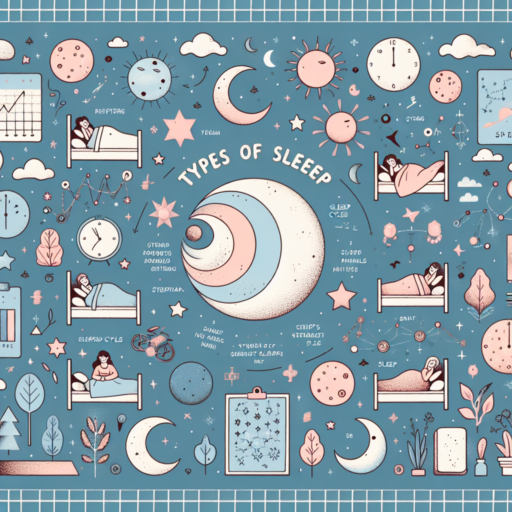Understanding the Concept of Ideal Deep Sleep
When discussing ideal deep sleep, it’s crucial to understand that this restorative sleep phase plays a significant role in overall health. Deep sleep, also known as slow-wave sleep, is the period during which the body repairs itself, consolidates memories, and rejuvenates for the next day. Achieving an ideal amount of deep sleep can significantly enhance an individual’s well-being.
While the exact amount of deep sleep required can vary from person to person, experts often recommend that adults aim for at least 20% of their total sleep time to be in this restorative stage. This translates to approximately 1.5 to 1.8 hours of deep sleep for a typical 8-hour sleep cycle. It’s during this phase that the body performs critical recovery processes, including muscle growth, tissue repair, and hormone regulation.
Factors influencing the quality and quantity of deep sleep can include lifestyle choices, sleep environment, and stress levels. Simple adjustments, such as maintaining a regular sleep schedule, creating a restful environment, and reducing caffeine intake, can significantly improve deep sleep durations. Moreover, understanding the role of electronic devices and their impact on sleep quality is essential. The blue light emitted can interfere with the body’s natural circadian rhythms, potentially reducing deep sleep phases.
The Science Behind Deep Sleep and its Benefits
Deep sleep, often referred to as slow-wave sleep, plays a pivotal role in our overall health and well-being. This stage of slumber is crucial for physical restoration, memory consolidation, and hormonal balance. Understanding the underlying mechanisms of deep sleep can unveil why it’s so beneficial for both mental and physical health.
During deep sleep, the brain waves slow down remarkably, entering a phase known as delta waves. This reduction in brain activity allows the body to focus on repair and rejuvenation processes. One of the key hormones released during this stage is human growth hormone (HGH), which is essential for cell regeneration, muscle growth, and the maintenance of healthy tissues. Moreover, deep sleep supports the removal of toxic waste byproducts accumulated in the brain, a process crucial for cognitive health and function.
The benefits of deep sleep extend beyond physical health. It plays a significant role in emotional and psychological well-being. Adequate deep sleep can help to bolster emotional resilience, improve mood, and enhance cognitive abilities such as learning, memory, and decision-making. Furthermore, the quality of deep sleep has been linked to a lower risk of developing chronic conditions such as obesity, diabetes, and heart disease.
Despite its critical importance, many people struggle to attain sufficient deep sleep. Factors such as stress, screen time before bed, and irregular sleep schedules can disrupt the natural sleep cycle, leading to diminished time spent in this restorative stage. Recognizing the signs of inadequate deep sleep and taking steps to promote a healthier sleep environment can lead to significant improvements in overall health and quality of life.
How Many Hours of Deep Sleep Do You Really Need?
Understanding the importance of deep sleep is critical for maintaining optimal health and well-being. Deep sleep, or slow-wave sleep, plays a key role in various body functions, including tissue repair, immune function, and energy restoration. Experts suggest that adults should aim for approximately 1 to 2 hours of deep sleep per night, which accounts for about 20-25% of total sleep.
The Role of Deep Sleep
During deep sleep, your body goes through essential physiological changes. This stage helps in memory consolidation, where information and experiences from the day are processed and stored. Deep sleep also aids in physical recovery, restoring energy, and bolstering the immune system. Not getting enough deep sleep can affect cognitive functions, mood, and overall health.
Achieving adequate deep sleep can be influenced by various factors, including lifestyle choices and sleep environment. Ensuring a consistent sleep schedule, optimizing your sleeping environment for comfort and minimal disruptions, and avoiding stimulants before bedtime can help increase the quality and quantity of deep sleep. Paying attention to these elements can significantly impact your deep sleep duration and quality, promoting better health and well-being.
Top Techniques to Achieve the Ideal Deep Sleep
Finding the key to achieving the ideal deep sleep can significantly enhance your overall health and energy levels. In the pursuit of this restorative night’s sleep, it’s essential to focus on specific techniques that encourage both physical and mental relaxation. Below, we delve into some of the most effective strategies.
Create a Sleep-Inducing Bedroom Environment
One critical factor that often gets overlooked is the importance of creating a conducive sleep environment. This involves ensuring your bedroom is cool, quiet, and dark. Studies suggest that a temperature around 65°F (18°C) is optimal for sleep. Consider using blackout curtains to block out light and white noise machines to drown out disruptive sounds. Investing in a comfortable, supportive mattress and pillows can also make a significant difference in achieving deep sleep.
Establish a Relaxing Pre-Sleep Routine
Engaging in a relaxing pre-sleep routine is pivotal for transitioning from the day’s hustle to a more restful state. Around 30 minutes before bedtime, start winding down by engaging in calm activities such as reading a book or taking a warm bath. The aim is to signal to your body that it’s time to slow down. Avoiding electronic devices, which emit blue light, is crucial during this time as it can interfere with your body’s natural melatonin production, a hormone vital for sleep regulation.
Regulate Your Sleep Schedule
Maintaining a consistent sleep schedule is fundamental in syncing your body’s internal clock. Try to go to bed and wake up at the same times every day, even on weekends. This regularity helps to stabilize your body’s sleep-wake cycle, making it easier to fall asleep and wake up naturally. Consistency is key, as even minor shifts in your sleep patterns can have a significant impact on your ability to reach deep sleep stages.
Common Obstacles to Deep Sleep and How to Overcome Them
Deep sleep is crucial for our physical health and mental well-being, yet many individuals find it elusive due to various common obstacles. Understanding these barriers and how to address them can significantly improve your sleep quality and, consequently, your overall health.
Stress and Anxiety
One of the most significant hindrances to achieving deep sleep is stress and anxiety. These emotions activate the body’s stress response, making it challenging to relax and drift off into deep sleep. Practicing relaxation techniques before bed, such as deep breathing exercises, meditation, or progressive muscle relaxation, can help mitigate stress’s impact on sleep.
Inconsistent Sleep Schedule
Maintaining an inconsistent sleep schedule can disrupt your body’s internal clock, making it difficult to enter deep sleep phases. Establishing a regular bedtime and wake-up time—even on weekends—can help regulate your body’s circadian rhythm and improve your chances of achieving restorative sleep.
Exposure to Blue Light
Another obstacle to deep sleep is exposure to blue light from screens, which can interfere with the production of melatonin, the hormone that signals your body it’s time to sleep. Minimizing screen time at least an hour before bed and using blue light filters on electronic devices can help counteract this effect and promote better sleep hygiene.
The Impact of Diet and Exercise on Deep Sleep Quality
The quality of our deep sleep is significantly influenced by various lifestyle choices, with diet and exercise playing crucial roles. Understanding the link between these factors and sleep can help in making informed decisions to enhance our sleep quality. Deep sleep, a critical phase of our sleep cycle, is essential for physical restoration, memory consolidation, and metabolism regulation. Therefore, optimizing our diet and exercise routines is pivotal for achieving better deep sleep quality.
How Diet Influences Deep Sleep Quality
What we eat has a direct impact on our sleep patterns. Consuming a balanced diet rich in fruits, vegetables, whole grains, and lean proteins can promote better deep sleep. Certain nutrients, like magnesium and melatonin, found in foods such as almonds, cherries, and fatty fish, are known to enhance sleep quality. Conversely, caffeine and high-sugar foods consumed close to bedtime can disrupt the sleep cycle, reducing the duration of deep sleep. Thus, making mindful food choices is integral to improving deep sleep quality.
Exercise and Its Effects on Deep Sleep
Regular physical activity is another cornerstone of good sleep hygiene. Exercise, particularly aerobic exercises such as jogging, swimming, or cycling, can significantly improve the quality of deep sleep. Engaging in regular exercise helps to increase the amount of time spent in deep sleep, aiding in the physical repair process and cognitive function improvement. However, it’s important to note that the timing of exercise can influence sleep; vigorous exercise close to bedtime may interfere with the ability to fall asleep. Ideally, moderate exercise should be done at least a few hours before bed to optimize its sleep-enhancing benefits.
No se han encontrado productos.
Essential Bedroom Environment Tips for Enhancing Deep Sleep
To achieve the deep, restorative sleep that our bodies need, the environment where we rest plays a crucial role. Considering how we can optimize our bedroom for better sleep involves addressing several sensory experiences – from what we see to what we feel. These essential bedroom environment tips can guide you through setting up a sanctuary designed for enhanced sleep quality.
Optimize Your Lighting
Light exposure plays a significant role in our sleep cycle due to its impact on our body’s natural circadian rhythm. To nurture deeper sleep, minimizing exposure to blue light from screens at least an hour before bed is essential. Additionally, using blackout curtains or a sleep mask can help block external light sources, creating an ideal dark environment that promotes melatonin production, essential for deep sleep.
Ensure Comfortable Bedding
The tactile experience of our bedding significantly affects our ability to fall and stay asleep. Opting for breathable materials, such as cotton or bamboo, can help regulate body temperature, reducing night sweats and discomfort. Equally important is the choice of a supportive mattress and pillows that align with your sleeping position, preventing aches and enhancing the quality of your sleep.
The Role of Technology in Improving Deep Sleep
In today’s rapidly advancing world, technology plays a critical role in enhancing the quality of deep sleep, a fundamental component of overall health and well-being. Innovations in sleep technology are providing individuals with unprecedented insights into their sleep patterns, enabling the development of personalized strategies to improve sleep quality.
One of the most significant advancements in sleep technology is the development of wearable sleep trackers. These devices monitor various physiological parameters such as heart rate, body movement, and breathing patterns during sleep. By analyzing this data, individuals can gain a deeper understanding of their sleep cycles, including the amount of time spent in deep sleep, and identify potential disturbances affecting their sleep quality. Consequently, users can adjust their sleep environments or routines to foster better deep sleep stages.
Another key area where technology is making an impact is through smart home devices designed to create an optimal sleep environment. Smart thermostats can adjust the room temperature to an individual’s preferred sleeping conditions, while smart lighting systems can simulate natural sunrise and sunset, helping regulate the body’s internal clock. These technological interventions work in tandem to support the body’s natural sleep-wake cycle, promoting more restorative deep sleep.
How Stress Affects Your Deep Sleep and Ways to Combat It
Deep sleep plays a crucial role in your overall health, aiding in the repair of your body and consolidation of memories. However, stress can significantly impair your ability to achieve this restorative sleep stage. When you’re under stress, your body produces elevated levels of cortisol, a stress hormone that can keep you alert and awake, making it difficult to fall into a deep sliver of slumber.
Research has shown that chronic stress not only shortens the amount of time you spend in deep sleep but also decreases the quality of sleep you get. This reduced sleep quality can lead to a vicious cycle where the less deep sleep you get, the more susceptible you are to stress, further impairing your sleep quality. It’s a cycle that can have detrimental effects on your mental, emotional, and physical health.
To combat the impact of stress on deep sleep, consider incorporating relaxation techniques into your nightly routine. Mindfulness meditation, deep breathing exercises, and progressive muscle relaxation are effective methods to lower stress levels and prepare your body for a night of deep sleep. Additionally, establishing a consistent sleep schedule and creating a comfortable sleep environment can significantly improve your sleep quality.
Monitoring Your Sleep: Tools and Technologies for Better Sleep Quality
In the quest for achieving better sleep quality, various tools and technologies have emerged, promising to enhance our understanding and management of sleep patterns. With a plethora of devices and apps at our disposal, pinpointing the right solution can feel overwhelming. By leveraging the right technology, individuals can gain invaluable insights into their sleep cycles, identify potential issues, and implement practical solutions to improve overall sleep health.
Wearable Sleep Trackers
Among the most popular devices for monitoring sleep are wearable trackers. These gadgets, often worn around the wrist, track a range of data including sleep duration, quality, and even specific sleep stages such as light, deep, and REM sleep. Brands like Fitbit, Garmin, and Apple have integrated advanced sleep tracking functions into their wearables, offering users detailed reports on their sleep metrics. Such data can be instrumental in recognizing sleep patterns and tailoring bedtime routines for enhanced sleep quality.
Smart Mattresses and Pillows
Advancements in bedroom technology have also led to the development of smart mattresses and pillows, designed to optimize sleep experience. These innovative products can adjust firmness, track sleep phases, and even regulate temperature, all tailored to the user’s preferences. By analyzing sleep data collected by sensors embedded in the mattress or pillow, users can receive personalized recommendations to improve sleep comfort and efficiency.
Mobile Sleep Applications
For those looking for a more accessible entry point into sleep monitoring, various mobile applications offer comprehensive tools to track and analyze sleep patterns. Apps like SleepCycle, Calm, and Headspace use the smartphone’s accelerometer and microphone to monitor movements and sounds during sleep, providing insights into sleep quality and offering guided meditations or white noise options to aid sleep. The convenience and simplicity of these apps make them a favorable choice for many seeking to better understand and improve their sleep habits.
By exploring these tools and technologies, individuals can take proactive steps towards enhancing their sleep quality. Understanding the nuances of one’s own sleep patterns is the first step in crafting a personalized approach to better rest, ultimately contributing to improved health and well-being.



